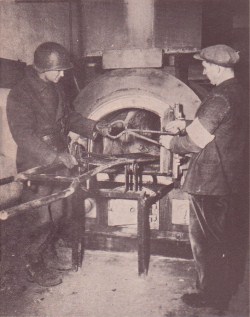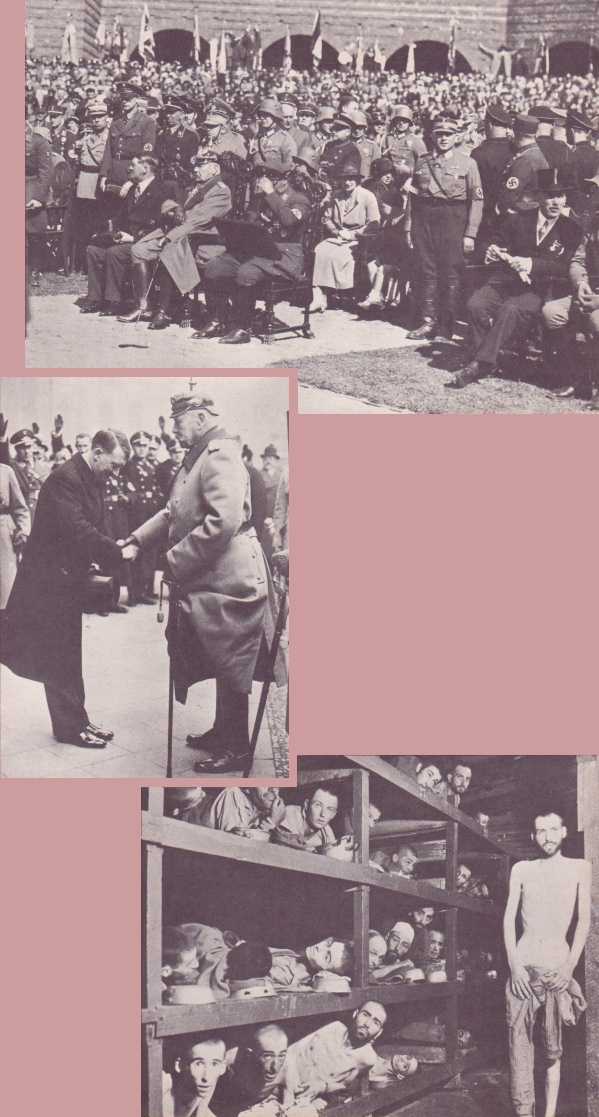How Today's Germans Feel About Trials
The men now facing a charge of mass murder represent only a small fraction of thousands of dull, unquestioning Germans who accepted the social fact of anti-Semitism. To these unthinking Germans it seemed right — and to many it still does — to have a particular race annihilated.
It might be understandable why those facing the courts of justice deny their guilt. But the shocker is the attitude of mind of the average German about these trials. From the nation's leaders right down to the common man on the street!
Helmut Thielicke, noted Hamburg theologian, when asked about the Jews killed in the Third Reich, gives this warning: "We, the survivors of the catastrophe, act as if nothing had happened."
Konrad Adenauer, to Party friends, declared: "The men of the SS-Elite Corps were soldiers like others. Make it clear to foreigners that the S.S. had nothing to do with secret service and Gestapo. Make it clear to them that the SS-Elite Corps didn't kill any Jews, but rather behaved like distinguished soldiers, which the Russians feared above all others."
And what happens to the few Germans who did secretly aid the Jews under Hitler's reign? Take the classic example of a German businessman who helped hundreds of Jews escape certain death during Hitler's reign of terror.

Wide World Photo
Cremating oven in German Concentration
Camp examined by French soldiers
toward close of war.
|
"Hundreds of Jews saved by a German businessman from the Nazis have formed a world fund to help him start a new life. For 56-year-old Oskar Schindler of Frankfurt is penniless. His cement factory has gone bankrupt mainly, he claims, because German customers boycotted it when they learned how he helped Jews in wartime Poland. Schindler has been officially commended by the Israeli Government for saving the lives of 1,200 Jews who worked in his wartime factory, and for rescuing another 17,000 by indirect assistance at great danger to himself. Now Schindler lives in a little rented room, almost destitute, ill from a heart complaint" (Sunday Express, London, March 22, 1964).
When the Frankfurt trial opened last December, many of the arrested men had to be escorted to Frankfurt by lawyers. Why? Because no police officer would be seen escorting these men to the trial. Lawyers feel that probably 90 per cent of the German people are opposed to these trials.
These are not isolated incidents of right-wing nationalists preaching a message of hate. Widespread sympathy of the average German toward former SS-men now on trial comes out constantly in many different aspects of the average German's way of life. A London paper summed up this feeling quite well. In an article captioned "Germans grow weary of the Mark of Cain," the editor reported:
"People grow weary of rubbing at the mark of Cain. Few West Germans say so publicly, but privately many speak resentfully and sometimes bitterly of the seemingly endless trials to punish Hitler's henchmen . . ." (Evening News, February 24, 1964).
Take the experiences of Dr. Elmer Herterich, nerve specialist from Wurzburg as an example. This man showed that a large number of high officials in the local Wurzburg government had been former high-ranking Nazis, guilty of crimes against humanity. His accusations were backed up by photo-static copies of original documents.
|
But what happened? Were the city officials forced to resign? Did the German populace support Dr. Herterich?
Not at all! In fact, the people of Wurzburg turned against him. Dr. Herterich no longer lives in Wurzburg nor any other part of Germany. After having received no backing at all from the government nor from his fellow-citizens, and after threats to take his life were directed against him, this staunch anti-Nazi left Germany for Sweden. With no backing whatsoever, Dr. Herterich realized he was fighting a losing battle.
During the last half year, a flush of German magazines and newspapers carried articles about Adolf Hitler and the Third Reich. Without exception, "der Fuhrer" is portrayed as having been a kind and understanding man, whose knowledge about different aspects of social life was admirable.
At the same time, the evils of Hitler, and what really went on, are rarely mentioned in school textbooks. One hears comments like this quite often: "It's all right to let people know you belonged to the Nazi Party. It's all forgotten now — it wasn't all that bad, anyway."
In Germany, the old Nazis live as comfortably and respectably as ever. They are not ostracized from Germany's new democratic society. They are exonerated; whereas those who fight them are held in contempt!
The Hidden Danger
There is one thing peculiar about Germans: the lack of self-analysis. Not noted for an excessive quality of individuality, the average German sanctions the decisions of the few ruling over him. Not especially politically alert, the German falls prey to the elite class, which guides the thinking of the German masses in whatever direction they wish to lead them. The trait of unquestioning obedience to those in the seats of government — whatever form it is — makes it comparatively easy for Germans to yield themselves in total obedience without qualms of conscience.
One German law official feels that it is his duty to work for the day, far off though it may be, when Germans would question authority. Another law-enforcing official confessed that his fears for Germany stemmed from precisely this profound tendency to be unconcerned about freedom of choice and to fall into line on orders from above. A German statesman said recently: "Germans don't have the aptitude to decide their own future. It is necessary to force them into their fortune."
History attests this to be an irrefutable fact. The German has for centuries never exercised individual liberty — not even now. "Let's begin to write the word freedom for the individual person in capital letters" cry a few German newspapers. They realize how little freedom the average German really exercises.
Why Hitler Rose
Germans as a whole identified themselves with Hitler's Third Reich from its infancy to its fall. After all, they were an integral part of the German Reich — they were the followers! And follow they did. Their zealous support for Hitler went all the way. At public conventions, the Germans massed themselves before their Fiihrer, treating him as their savior. They were all too eager to hail him as a god not unlike the divine salute Romans gave to their Caesars. On Hitler's birthday, almost every German flew a flag; if for nothing else, it served as a reminder to their Filhrer that the people were behind him — ready to support him and his policies.
They allowed their children to be trained in special Nazi youth organizations, so that tomorrow's leaders would carry on the policy of "Deutschland iiber alles," which included the policy of suppressing all other races. No German was ignorant of what Hitler was planning, though it is not uncommon to hear the excuse of being forced to join the Nazi Party. This, in almost every case, is exactly that — an excuse!
My parents never flew a flag on Hitler's birthday. My father refused to join the Wehrmacht, even though they threatened to shoot him. My mother did not let us join any Nazi organization, where our minds would be open to indoctrination. We, as a family, never attended any of Hitler's mass rallies. Yet we all survived — and that without ever joining the Nazi Party or even carrying a swastika armband.
Is it any wonder then that Hitler believed his people — das deutsche Volk — to be firmly behind him? When the "superior" race shouted: Sieg Heil! and Heil Hitler! could we have expected the Fiihrer to resign? or to hand over the leadership of this eager people to someone else?
It was the German people who made Adolf Hitler. Without their support he could not have gone far. Germans know how fervently they expressed their support for Hitler and the other leaders. They are aware of their former allegiance to the Fiihrer and everything the German Reich stood for.
The Germans followed Adolf Hitler because they believed him to be their savior, and themselves to be a people who were destined to restore German "Kultur" in the world. In this they must also share part of the blame.
|
Germany's top leaders gather at dedication of Hindenberg Memorial. Hindenberg turned over full control of German government in 1933 to the new Chancellor, Adolf Hitler. British guest, second from right, in foreground, sits naively by. DPA
|
 |
|
Hitler could not have come to power as Chancellor without the consent of the German military. Here you see Hitler bowing to Reichsprcisident von Hindenberg. DPA
|
|
Wide World Photo
The crimes of the Third German Reich ended with hundreds of horror scenes such as this one. Slave laborers from all over Europe were forced to work for German industrialists. As war ended tens of thousands starved to death as transportation system collapsed. Countless others, too old to work, were sent to concentration camps — and death!
|